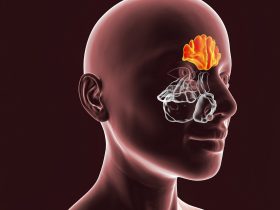A study presented at the recent American Rhinologic Society Annual Meeting in Philadelphia, PA, September 9-10, 2022, demonstrated that medication compliance plays a key role in disease recurrence in patients with Allergic fungal sinusitis (AFS) involving the frontal sinus.
Allergic fungal sinusitis is a distinct endotype of rhinosinusitis, characterized by diffused nasal congestion, viscous nasal secretions, and polyps, with an incidence of between 6 and 9% of all rhinosinusitis requiring surgery. It is caused by environmental allergens, and patients with this condition often have significantly associated allergies to mold and other allergens, and they also suffer from nasal polyps or asthma. Clinical follow-up and medication adherence play a key role in preventing disease progression.
While continued efforts have been made in the past to understand the true underlying mechanism of this disease, its treatment is currently centered on surgical intervention to clear the disease with subsequent medical therapy to prevent the recurrence. It is reported that during endoscopic sinus surgery, the sinus penetration to topical therapy through the high flow irrigation is improved significantly following the surgery, and compliance to this has shown promising results in reducing revision surgery. However, due to the anatomical relationship and orientation of the frontal sinus, it is difficult to reach with irrigations.
A team of researchers from Augusta University Health led by Dr. Eun Jeong examined the effect of medication compliance and adherence to clinical follow-up on the recurrence of AFS of the frontal sinus.
The study was a retrospective review of patients with AFS involving the frontal sinus and patients with a history of frontal sinus surgery at Augusta University Medical Center. The study’s primary outcomes were primary vs. revision surgery, medical compliance, clinical follow-up, recurrence of AFS, time to recurrence, and subsequent revision surgery.
The study’s results indicated that out of 117 patients who met the inclusion criteria, 62 (53%) were lost to follow-up, while 55 patients could be followed throughout their disease. Over 90% of patients with frontal AFS had ethmoid involvement with primary and recurrent disease presentation.
The conclusion derived by the team when evaluating medical compliance and treatment follow-up was:
- Of the 55 patients, 32 (58.2%) were noncompliant, and 26 (81.3%) had recurrent disease requiring revision surgery.
- Of the 23 patients who were compliant with medication, only 3 (13.0%) had recurrent disease.
These results indicated that although surgical treatment is the backbone that restores patency and determines the accessibility of irrigation to the frontal sinuses, the frontal sinus is a dependent sinus in AFS patients, and hence more emphasis should be placed on medical treatment to reduce recurrences.
The study suggested that lack of clinical follow-up and medication compliance are critical factors that may indicate why patients with allergic fungal sinusitis often have advanced disease upon presentation. Moreover, the study concluded that once the disease below the frontal recess is cleared and if the patient complies with his treatment process, the disease is unlikely to reoccur.



